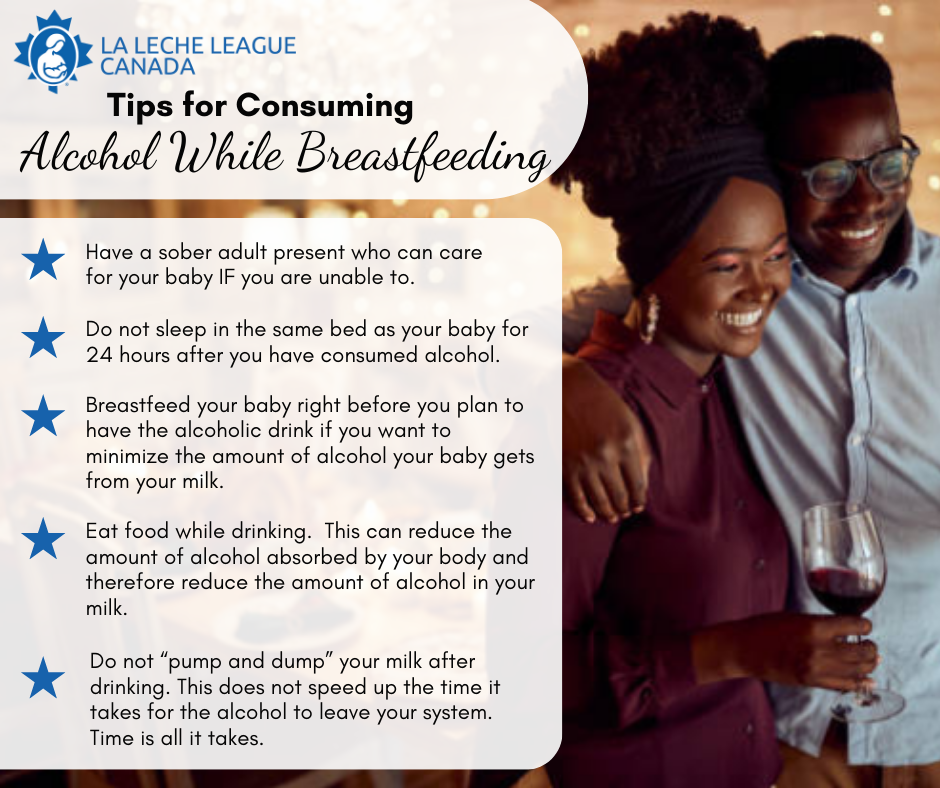
Parents often want to know what effect drinking alcohol could have on their nursing babies.
Occasional drinking while breastfeeding has not been shown to have any negative effects on breastfeeding babies.
Understanding blood and milk alcohol levels
When you consume an alcoholic drink, the alcohol passes very quickly from your blood into your milk. Therefore the amount of alcohol in your blood is the same as the amount of alcohol in your milk. And as your blood alcohol level decreases so does your milk alcohol level.
The legal blood alcohol limit to drive in Canada is 0.08%. Every person is different but on average, a woman weighing 68 kg (150 lb) will have a blood alcohol level 0.01% one hour after consuming one drink, and 0% after 2 hours. This same average woman will have a blood alcohol level of 0.05% one hour after drinking two drinks, 0.03% after two hours, 0.02% after three hours and 0% after four hours.
One drink equals:
- 341 ml (12 oz) of beer with 5% alcohol
- 142 ml (5 oz) of wine with 12% alcohol
- 43 ml (1.5 oz) of spirits with 40% alcohol.
If your baby feeds when your blood alcohol level is 0.01%, your baby will be drinking milk with 0.01% alcohol. If your baby feeds when your blood alcohol level is 0.05%, your baby will be drinking milk with 0.05% alcohol. Those are both extremely small levels of alcohol. For example, plain apple juice contains 0.06-0.66% alcohol (depending on the brand).
Impacts of drinking alcohol
There is the possibility that drinking large amounts of alcohol could decrease your milk-ejection reflex (letdown). This could reduce the amount of milk your baby gets in the few hours after you have consumed alcohol. Research has shown this reduction in milk volume to be small (less than 10%) and will not be experienced by all women.
Drinking large amounts of alcohol can cause drowsiness, sleep problems, increased crying, decreased weight gain, and possible developmental delays in your baby.
Occasional drinking while breastfeeding has not been shown to be harmful to nursing babies.
Tips for Consuming Alcohol while Breastfeeding
- Have a sober adult present who can care for your baby if you are unable to. Heavy drinking can impair your ability to attend to your baby safely.
- Do not sleep in the same bed as your baby for 24 hours after you have consumed alcohol. This could put your baby at risk of smothering due to a reduction of your usual awareness and responsiveness during this period of time.
- Breastfeed your baby right before you plan to have the alcoholic drink if you want to minimize the amount of alcohol your baby gets from your milk.
- Eat food while drinking. This can reduce the amount of alcohol absorbed by your body and therefore reduce the amount of alcohol in your milk.
- Do not “pump and dump” your milk after drinking. This does not speed up the time it takes for the alcohol to leave your system. Time is all it takes.
If you have any questions about alcohol and breastfeeding, contact a local La Leche League Leader for more information.
Please consider supporting LLLC.
References:
Gorgus. E., Hittinger, M., Schrenk, D. (2016). Estimates of Ethanol Exposure in Children from Food not Labeled as Alcohol-Containing. Journal of Analytical Toxicology, 40(7): 537–542.
Haastrup, M. B., Pottegard, A., Damkier, P., (2013). Alcohol and Breastfeeding. Basic & Clinical Pharmacology & Toxicology, 114, 168-173.
International Breastfeeding Centre. (2020). Breastfeeding and Medications. ibconline.ca.
La Leche League International. (2021, March). Drinking Alcohol and Breastfeeding.
Mohrbacher, Nancy. (2020). Breastfeeding Answers: A Guide for Helping Families, Second Edition. Nancy Mohrbacher Solutions, Inc.
Smart Serve Ontario. (n. d.). Understanding Blood Alcohol Concentration. smartserve.ca.
Updated 2022
